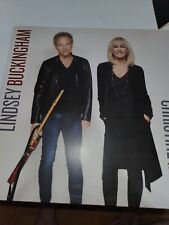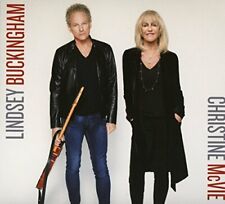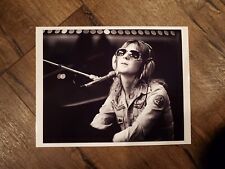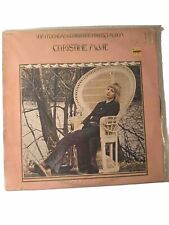|
1980
One More Night The band did indeed play for hundreds of thousands (the final count, if the subsequent LP's inner sleeves can be believed, is an incredible 1,276,000 people) during its exhaustive 1979-80 tour, and the deluge of singles from Tusk kept Fleetwood Mac in the charts and the public eye thoughout the year. In the UK, CBS yet again released a compilation album of tracks from the '67-'69 period, this time entitled Black Magic Woman. Not to be confused with the 1971 US double album of the same name, this album is only a single disc (but of course covers much of the same material). CBS also had a go at recycling the old Chicken Shack back catalog and came up with the In The Can collection, much of which features Christine's participation. Peter Green was also busy. Given the immediate success of In The Skies in both Britain and the Continent, PVK began to push--gently--for a follow-up. Green confessed that he had virtually no new material despite the fact that In The Skies had been recorded over two years before. So his brother Michael stepped in and provided the necessary tunes. The resulting album, Little Dreamer (also the title of the only Peter Green- penned song on the disc) hit the stores in June. Like its predecessor, Little Dreamer is an excellent collection of diverse songs (though this time the religious-flavored material is eschewed for more conventional blues/rock): from the old Booker T. and the MGs number "Born Under a Bad Sign" to the rocking "Walking the Road", to the self-deprecating, yet somehow good- humored "Loser Two Times" (which would've fit perfectly well on Then Play On). Green sings with a self-confidence lacking on the earlier effort. And of course his guitar skills--he played lead this time out--had never left him. A splendid effort overall, which broke through into the US Top 200 Albums chart, making it to #186. Bob Welch released his fourth solo album, Man Overboard, in July. This album was another departure for Bob, but with considerably less success. The dark quality which served him so well--at least artistically--on The Other One is eschewed for alternatively a more bombastic, film-soundtrack style, with all its attendant sound effects and so on (side one would make a great horror-movie soundtrack), or a more Top 40-oriented sound on side two. But despite such promising tunes as the title track, "B666", and "Don't Rush The Good Things" (the first single), again Capitol failed to promote this album adequately. After a brief foray into the Top 200 chart (making it no higher than 162), the LP stiffed. The singles didn't chart at all. In just a year and a half, the record-buying public had gone from multi-platinum support to almost total indifference. Welch's four-LP contract with Capitol expired, and was not renewed. Billy Burnette, no stranger to label troubles himself, switched over from Polydor to Columbia Records, and he released yet another album entitled Billy Burnette. This time, however, a minor hit single "Don't Say No" was spawned. This is the first-- and so far the only--time a BB single charted in Billboard's Hot 100. It made it to the respectable #68 slot. Perhaps the exposure his cousin Rocky got with "Tired of Toein' the Line" (which peaked in August 1980) helped a little. The big news for 1980, however, was the first-ever legitimate release of live Fleetwood Mac material (all previous attempts were still in the can at this point (more on them later), and there were of course scores of bootlegs floating out there as well). Fleetwood Mac Live, recorded during the lengthy 1979-80 world tour, was an effort--consciously or not--to usurp the bootleggers and also help recoup the titanic expense of keeping a band--with all its extravagant tastes (special hairdressers, makeup artists, oxygen tanks, as well as the occasional dealer)--like this on the road for eleven months. Like its predecessor, it is a double-disc set. Not surprisingly, virtually every song on Fleetwood Mac Live was taken from the 1975-1979 period, and consisted mostly of extended interpretations of the Big Hits and some of the better album tracks. But there were a few exceptions. The song "Oh Well" had been a centerpiece of the band's live act since before Peter Green's departure a decade before, and here a somewhat frantic Lindsey Buckingham is featured, trying to keep pace with the old master's (arguably) finest work. It got considerable airplay by FM rock radio stations in the US, but unfortunately only at the expense of the original masterpiece (or at least until the release of the box set, years later). There is also a reworking of Buckingham's "Don't Let Me Down Again" from the Buckingham Nicks album. Additionally, there were three completely new tracks, recorded for a selected audience of friends, road crews, etc., at the Santa Monica Civic Auditorium. The first of these, Stevie's nondescript "Fireflies", was released as a single, did only fair on the charts (#62). The second, a recording of a song that Beach Boy Brian Wilson gave the band, was also released on 45: "The Farmer's Daughter". This extremely mellow song has, despite its flawless sense of harmony that would make even Mr. Wilson blush, the dubious distinction of being the first new Fleetwood Mac single since 1974's "Heroes Are Hard To Find" to utterly fail to chart. The third, Christine's "One More Night", never made singles release. And, sad to say, the remaining tracks on the album are far from what they could be. The album was taken, not from a single show, but from a sampling of many different shows at various legs of the tour. One is left with the inescapable question that, given the no doubt innumerable available tapes of individual songs (they played 113 dates), "is this the best they could come up with?". Whoever chose the individual songs must have been rushed to get the product out, since too many of the tracks seem to capture the band on either a "bad night" or just when their enthusiasm seemed to be waning the most. Clearly a better job of selection could have been done. A relatively muddy mixing job did nothing to improve matters, either. Nevertheless, with all that said, it is still great to hear the band live! And it did attain its objective: sales were good (#14 in the US, #31 in Great Britain) and the bootleggers were upstaged (pun intended). After that, the band took a well- deserved break and concentrated on solo projects. It was also at this point that Seedy Management, the name of Mick's (and to a lesser extent John's) management company, proved to be just that. With all the partying going on all around them (and with them participating as well) during the tour, Mick found it impossible to "play the bad guy" and tell his band mates and the crew and hangers-on that enough was enough and that expenses were getting WAY out of hand. Consequently, the huge profits expected from such a long world tour never materialized. The resulting row nearly broke up the band for good, but instead Mick was simply fired from the managerial side of things. Maybe Peter Green wasn't so wrong about money after all....
|









![Christine McVie - Christine Mcvie (reissue) [New CD] Reissue picture](/vintage/img/g/tm8AAOSwpQxgrse5/s-l225/Christine-McVie-Christine-Mcvie-reissue-New-CD-Rei.jpg)